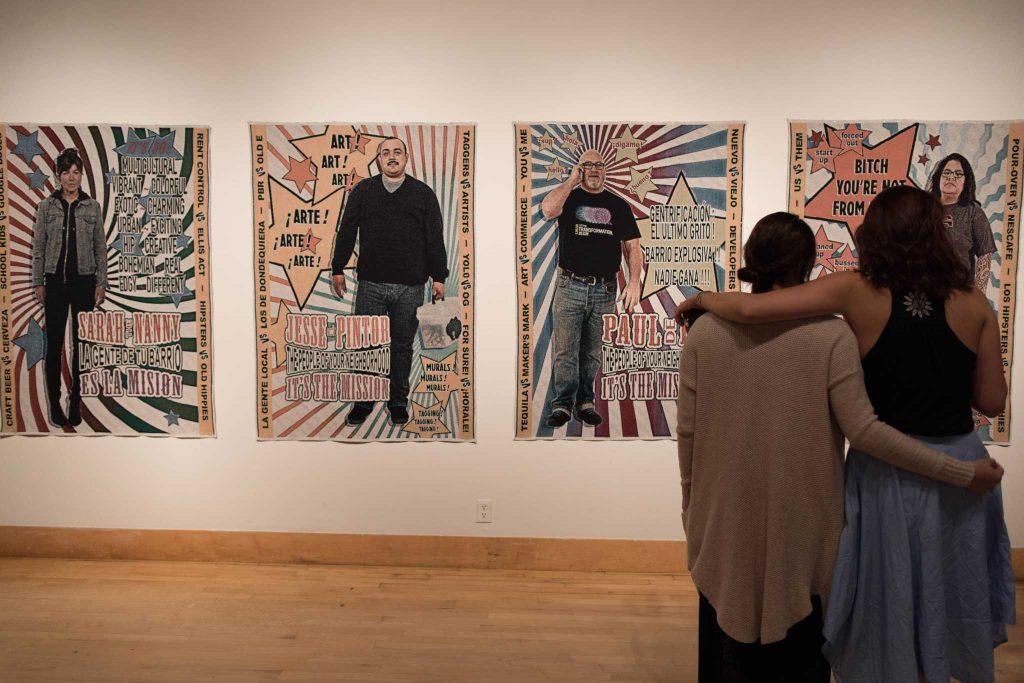The Fine Arts Gallery was bustling Tuesday night, with faculty and student conversations echoing throughout the large room. The white walls were well-lit, highlighting the faculty members’ artwork while students were immersed in their professors’ personal pieces. Four intricately woven tapestries showcasing four different residents of the Mission were hung up on a wall, staring back at viewers.
The tapestries were part of SF State associate professor Victor De La Rosa’s “The Mission Suite,” a series featured in the Art Faculty Exhibition, which opened Tuesday at 4 p.m. in the Fine Arts Gallery. The work was originally supposed to be installed at the 16th and Mission BART plaza last November, but after BART objected to the content of one of the pieces, De La Rosa had to decide whether to only show three of the four pieces.

He ultimately chose not to work with BART and instead collaborated with students to show the collection on his own at the station for a few hours. The art faculty exhibit will be the first time the pieces have all been shown since.
“I’m glad that it’s actually going to be on the campus, and I’m also very proud that the content of the work never became an issue between the college, the school or the gallery,” De La Rosa said. “Everyone is just looking at it for its merit.”
Carman Gaines, a junior majoring in art history and studio art, said she enjoys learning from the inspiration behind the faculty’s work.
“Pretty much all of the faculty are artists and professors so it’s great to see what inspires them and their teaching practice,” Gaines said.
The faculty exhibit, which runs through March 17, will showcase the work of 11 faculty members in the department, including De La Rosa. The exhibit is presented once every four years and is planned by students in associate professor Mark Johnson’s exhibition design course. It is one of two exhibits showcasing the work of professional artists that relate to the curriculum and research of the art faculty, according to Johnson.
“For the past 20 years, one of these two annual professional exhibitions is reserved as a faculty exhibition to give art students the opportunity to see the real work of their professors,” said Johnson, who is also the director of the Fine Arts Gallery.
De La Rosa said the exhibition not only offers students experience in their potential field, but gives faculty members a chance to showcase their work to students.
“It sort of shows everyone the breadth of skill, talent and experience that the faculty has to offer the students,” De La Rosa said.

Jeff Downing, a ceramics professor, showcased a memorial piece he created for his late father. Downing said this entire exhibit was a key learning experience for students.
“I think they’ll have a better understanding of what faculty does in their own time in their professional practice,” Downing said. “I, for myself, don’t teach what I do. I teach so students can develop their own voice, so they get to see me and how my work looks out there since a lot of my shows are not in San Francisco. So it’s kind of an access to the work.”
Ines Diot, a junior majoring in art history and studio art, was the installation manager of the exhibit. She said she learned how to help bring an artist’s vision to life within the exhibit space.
“What I take away from it is really organization skills and communications skills, because I had a team of installers, like six or seven of us, and I had to communicate with everyone constantly to see what was being done to relay it to Mark and also communicate with the artists and the faculty on how they wanted their art to be displayed,” Diot said.
Johnson said the exhibition prepares students for professional careers in galleries and museums.
“It was really nice being a part of the exhibition design experience, because it was kind of like practice,” said Renee Villasenor, a senior art history major. “It’s a good testing strip for everyone in the class.”
While working with the art is one of his favorite parts of the course, Johnson said collaborating with the students is more meaningful.
“There is no question that the best part of the job is working with SF State students,” Johnson said. “The current cohort is a great example – they are passionate, committed and professional.”








